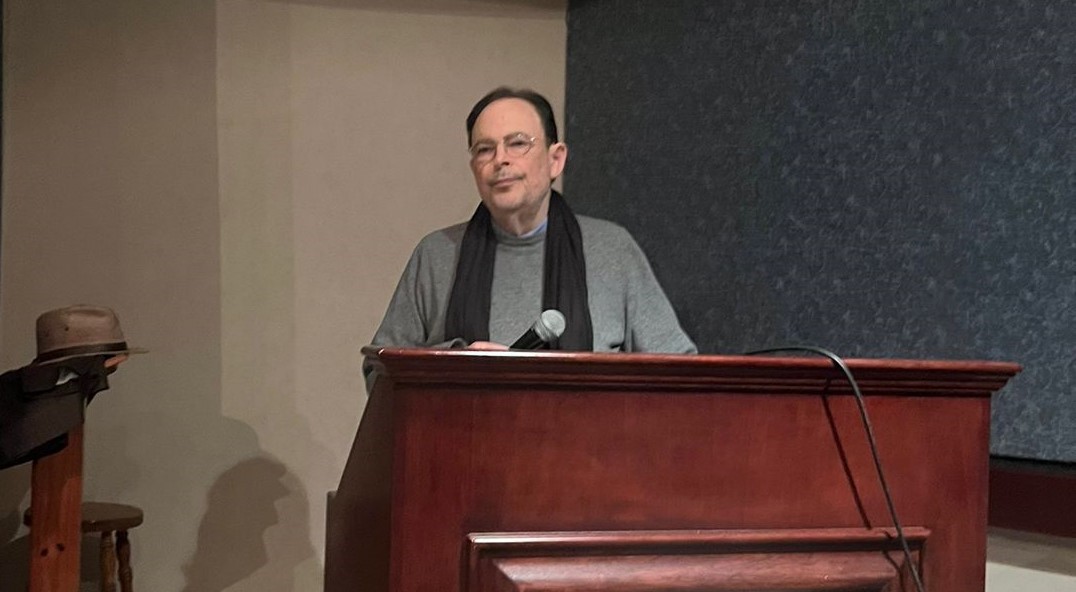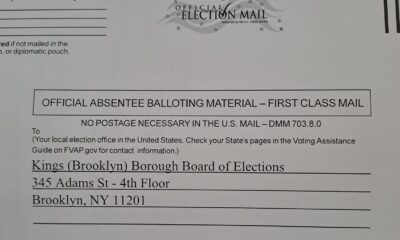
World

Jewish vote solidly Democrat, but fraying over Israel
Despite the hostility shown towards Israel and Jews from the political left in the United States, about 70% of American Jews are still likely to support the Democrats in the too-close-to-call November election. So said former American diplomat and writer, Brooks Spector, speaking at the Rabbi Cyril Harris Community Centre in Johannesburg on 1 September.
Before President Joe Biden (81) pulled out of the presidential race after his disastrous CNN debate against Donald Trump (78), Spector was going to subtitle his presentation, “The dance of the dinosaurs.” He now called it, “The prosecutor versus the felon”, as former prosecutor and vice-president, Kamala Harris, squares up against Trump, convicted for lying about his hush money payments.
Spector noted that Jewish Americans have largely voted for the Democrats since the first Franklin D Roosevelt victorious election in 1932 in the midst of the Great Depression. As the great wave of migrant East European Jews in the 1900s became US citizens, they voted overwhelmingly for the Democrats, while an older generation of German Jewish emigres tended to vote Republican.
“For years now, American Jews have taken for granted the fundamental of US government support for Israel and voted largely on the basis of socio-economic issues and the welfare state,” Spector said. “Now, however, the Israel-Gaza conflict has driven some of the old and new left away from the Democrats. In addition, some wealthier Jews have become Republicans, such as Miriam Adelson and a number of Las Vegas and Silicon Valley entrepreneurs.
“In my view,” Spector said, “Harris’s very careful formulation of Israel’s legitimate security, liberating the remaining hostages, relieving the suffering Palestinians living in Gaza, and the right of self-determination and the two-state formulation seems to have struck the right notes where American policy wouldn’t be beholden to the maximalist goals of any of the protagonists. She’s doing a tap-dance on a highwire.
“But would those who disagree with the current Biden-Harris administration, or the Harris formulation above, vote for Donald Trump in any numbers?” Would they support a minor candidate or simply stay home? We cannot know that yet.
“If current estimates are right, the split will be something close to 70/30, Democrats vs Republicans. Jewish votes may, or may not, be important in a few states, but those are probably Democratic-leaning states already. It’s cash that may matter more in the race for funding as campaigns are fiendishly expensive. Perhaps most important of all may be the impact of the commentariat and the intellectual content of prominent writers and analysts.”
Spector cited a 2023 opinion poll, conducted a few months before 7 October, that showed that in a high polarised US, “Jewish voters remain focused on the cultural issues that divide the country – democracy, abortion, and guns. They also prioritise inflation and climate change.” While more than 70% felt emotionally attached to Israel, they hold negative views towards Israeli Prime Minister Benjamin Netanyahu – 28% favourable to 62% unfavourable.
With rising antisemitism and anti-Israel sentiment from the political left since 7 October, more Jews are questioning their safety in the US and their political allegiance. Trump and the Republicans hope this will mean that Jews finally turn their backs on the Democrats.
“What would either president mean for Israel and Jews? We already know in broad outlines what a second Trump administration would set out as policies there. A Harris administration would have a relatively balanced position and probably less patience towards the Netanyahu government and its continuing programme in Gaza. I think it’s likely that either administration would be interested in pursuing a comprehensive peace programme, albeit with different points of emphasis perhaps. A comprehensive peace has been US policy for decades, after all,” Spector said.
“What will either president mean for South Africa? My suspicion is that a Harris administration will largely represent continuity with the broad outlines of the Biden policies, including support for continuation of AGOA [the African Growth and Opportunities Act]. I also expect some increased emphasis on climate and environmental protection.
“By contrast, a second Trump administration may well be less supportive for AGOA – note the vote will be by Congress, not a presidential decision – and will probably be more aware and attentive to South Africa’s actions that look like an embrace of Russia or China or Iran on issues of importance to the US such as the Russian invasion of Ukraine or American efforts to limit Iranian support for militants beyond its borders.”
The next big moment will be on 10 September, Spector said, in the first televised debate between Harris and Trump. “How she manages to portray herself will make all the difference. How a candidate looks is as important as what he or she says.”
No-one expects the two months before the US elections in November to be dull.










